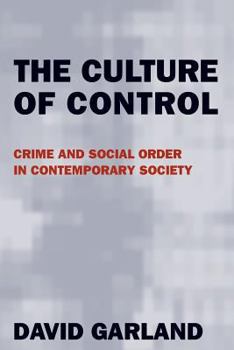The Culture of Control: Crime and Social Order in Contemporary Society
Select Format
Select Condition 
Book Overview
The past 30 years have seen vast changes in our attitudes toward crime. More and more of us live in gated communities; prison populations have skyrocketed; and issues such as racial profiling, community policing, and "zero-tolerance" policies dominate the headlines. How is it that our response to crime and our sense of criminal justice has come to be so dramatically reconfigured? David Garland charts the changes in crime and criminal justice in America...
Format:Paperback
Language:English
ISBN:0226283844
ISBN13:9780226283845
Release Date:February 1999
Publisher:University of Chicago Press
Length:336 Pages
Weight:1.05 lbs.
Dimensions:0.7" x 6.0" x 9.1"
Customer Reviews
1 rating
seminal work on US mass incarceration
Published by Thriftbooks.com User , 16 years ago
I'm surprised no one else has reviewed this book - I guess they're too busy trying to alter this trend. Garland's book represents an extremely solid, well-written and methodical approach to how and why the US rate and absolute number of imprisonment is the highest in the world. Garland reached an understanding of how this trend happened, was this process: 1. A shift from `penal welfare' to `retributive' model... 2. Prompted by social and tech. changes. 3. Enabled by a shift to political conservatism. 4. Resulting in a marginalization of subgroups. 5. Who were blamed for the problems in society, as was the liberal penal welfare model. 6. This shift resulted from a desire for security, order and control missing following #2. 7. And led to a combination of `market and moral discipline' with more controls on the poor and fewer on everyone else. He finds that the current system of mass incarceration does the following: -Creates systematic social, economic and political exclusion by race (social marginality) -Develops and supports criminal underclass through criminogenic nature of incarceration and parole/probation rules -Understates unemployment rate by removing `unemployable' from society. -Alters norms and values of communities across generations. -Creates a gulag system of economy, where prisoners are increasingly perform work for government and private business without pay. That's a very brief summary, I could go into much greater detail, but I'll stop here. This book is now being cited by any serious inquiry into the phenomenon. However, despite its being very well-written, it's a thick read, so I would not recommend it for an undergrad text.





